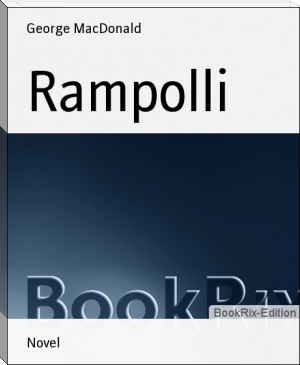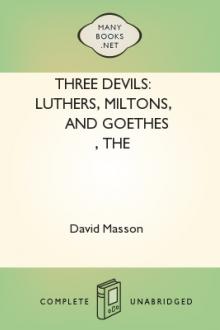Rampolli by George MacDonald (a book to read TXT) 📖

- Author: George MacDonald
Book online «Rampolli by George MacDonald (a book to read TXT) 📖». Author George MacDonald
PART II. SONNET LXXV.
The elect angels and the souls in bliss, The citizens of heaven, when, that first day, My lady passed from me and went their way, Of marvel and pity full, did round her press. "What light is this, and what new loveliness?" They said among them; "for such sweet display Did never mount, that from the earth did stray To this high dwelling, all this age, we guess!"[1] She, well content her lodging chang'd to find, Shows perfect, by her peers most perfect placed; And now and then half turning looks behind To see if I walk in the way she traced: Hence I lift heavenward all my heart and mind Because I hear her pray me to make haste.
[Footnote 1: Pure English of Petrarch's time.]
MILTON'S ITALIAN POEMS.
The Italian scholar will understand that the retention of the feminine rimes in translation from this language is an impossibility.
I.
O Lady fair, whose honoured name doth grace Green vale and noble ford of Rheno's stream- Of all worth void the man I surely deem Whom thy fair soul enamoureth not apace, When softly self-revealed to time and space By actions sweet with which thy will doth teem, And fair gifts that Love's bow and arrows seem- But are the flowers that crown thy perfect race. When thou dost lightsome talk or gladsome sing,- A power to draw the hill-trees, rooted hard- The doors of eyes and ears let that man keep Who knows himself unworthy thy regard! Grace from above alone him help can bring That Passion in his heart strike not too deep.
II.
As in the twilight brown, on hillside bare, Useth to go the little shepherd maid, Watering some strange fair plant, poorly displayed, Ill thriving in unwonted soil and air Far from its native springtime's genial care; So on my ready tongue hath Love assayed In a strange speech to wake new flower and blade, While I of thee, proud yet so debonair, Sing songs whose sense is to my people lost- Yield the fair Thames, and the fair Arno gain. Love willed it so, and I, at others' cost, Already knew Love never willed in vain: Would my heart slow and bosom hard were found To him who plants from heaven so fair a ground!
III.
CANZONE.
Ladies, and youths that in their favour bask, With mocking smiles come round me: Prithee, why, Why dost thou with an unknown language cope, Love-riming? Whence thy courage for the task? Tell us-so never frustrate be thy hope, And the best thought still to thy thinking fly! Thus me they mock: Thee other streams, they cry, Thee other shores, another sea demands Upon whose verdant strands Are budding, even this moment, for thy hair Immortal guerdon, bays that will not die: An over-burden on thy back why bear?- Song, I will tell thee; thou for me reply: My lady saith-and her word is my heart- This is Love's mother-tongue, and fits his part.
IV.
Diodati-and I muse to tell the tale- This stubborn I, that Love was wont despise And make a laughter of his snares, unwise, Am fallen-where honest feet will sometimes fail. Not golden tresses, not a cheek vermeil, Dazzle me thus; but, in a new-world guise, A foreign Fair my heart beatifies- With mien where high-souled modesty I hail; Eyes softly splendent with a darkness dear; A speech that more than one tongue vassal hath; A voice that in the middle hemisphere Might make the tired moon wander from her path; While from her eyes such gracious flashes shoot That stopping hard my ears were little boot.
V.
Certes, my lady sweet, your blessed eyes- It cannot be but that they are my sun; As strong they smite me as he smites upon The man whose way o'er Libyan desert lies, The while a vapour hot doth me surprise From that side springing where my pain doth won: Perchance accustomed lovers-I am none And know not-in their speech call such things sighs: A part shut in, sore vexed, itself conceals, And shakes my bosom; part, undisciplined, Breaks forth, and all around to ice congeals; But that which to mine eyes the way doth find, Makes all my nights in silent showers abound, Until my dawn[1] returns, with roses crowned.
[Footnote 1: Alba -where I suspect a hint at the lady's name.]
VI.
A modest youth, in love a simpleton, When to escape myself I seek and shift, Lady, I of my heart the humble gift Vow unto thee. In trials many a one, True, brave, I've found it, firm to things begun; By gracious, prudent, worthy thoughts uplift. When roars the great world, in the thunder-rift, Its own self, armour adamant, it will don, From chance and envy as securely barred, From fears and hopes that still the crowd abuse, As inward gifts and high worth coveting, And the resounding lyre, and every Muse: There only wilt thou find it not so hard Where Love hath fixed his ever cureless sting.
LUTHER'S SONG-BOOK.
DAME MUSIC.
Of all the joys earth possesses, None the gladness fine surpasses Which I give you with my singing, And with much harmonious ringing.
An evil spirit cannot dwell Where companions are singing well; Here strife, wrath, envy, hate, are not; Every heartache must leave the spot: Greed, care, all things that hard oppress Troop off with great unwillingness.
Also each man is free to this- For such a joy no trespass is, God himself pleasing better far Than all the joys on earth that are; It breaks the toils by Satan spun, And many a murder keeps undone.
Of this, King David is the proof, Who often Saul did hold aloof, All with his harping sweet and well, That he not into murder fell.
For God's own truth, in word and will It makes the heart ready and still; That knew Elisha well, I wot, When he the Spirit by harping got.
The best time of the year is mine, When all the little birds sing fine, Fill heaven and earth full of their strain: Much good singing is going then; The nightingale the lead she takes, And everything right merry makes With her gladsome lovely song, For which great thanks to her belong.
But more to our dear Lord God, much, Who has created the bird such, A songstress of the true right sort, A mistress of the music-art: She sings and springs, both nights and days, To him, not weary of his praise. Him lauding come my songs as well, My everlasting thanks to tell.
LUTHER'S SONG-BOOK.
I. ADVENT
II. CHRISTMAS
III. EPIPHANY
IV. EASTER
V. PENTECOST
VI. THE TRINITY
VII. THE CHURCH AND WORD OF GOD
VIII. GRACE
IX. THE COMMANDMENTS
X. THE CREED
XI. PRAYER
XII. BAPTISM
XIII. REPENTANCE
XIV. THE LORD'S SUPPER
XV. DEATH
XVI. THE PRAISE OF GOD
OF LIFE AT COURT
I. ADVENT.
Come, saviour of nations wild, Of the maiden owned the child That may wonder all the earth God should grant it such a birth.
Not of man's flesh or man's blood Only of the Spirit of God Is God's Word a man become, And blooms the fruit of woman's womb.
Maiden, she was found with child, Nor was chastity defiled; Many a virtue from her shone: God was there upon his throne.
From that chamber of content, Royal palace pure, he went; God by kind, in human grace Forth he comes to run his race.
From the Father came his road, And returns again to God; Unto hell it did go down, Up then to the Father's throne.
Thou, the Father's form express, Get thee victory in the flesh, That thy godlike power in us Make sick flesh victorious.
Shines thy manger bright and fair; Sets the night a new star there: Darkness thence must keep away; Faith dwells ever in the day.
Honour unto God be done; Honour to his only son; Honour to the Holy Ghost, Now, and ever, ending not. Amen.
II. CHRISTMAS.
I.
Jesus we now must laud and sing, The maiden Mary's son and king, Far as the blessed sun doth shine, And reaches to earth's utmost line.[1]
[Footnote 1: Luther's own construction.]
The blessed maker of all we view On him a servant's body drew, The flesh to save at flesh's cost, Else his creation had been lost.
From heaven high the Godlike grace In the chaste mother found a place; A secret pledge a maiden bore- A thing to earth unknown before.
The tender heart, house modest, low, Straightway a temple of God did grow: Whom never man hath touched or known By God's word she with child is grown.
The noble mother hath brought forth Whom Gabriel promised to the earth; Him John did greet in joyous way While in his mother's womb he lay.
Right poorly lies in hay the boy; Th' hard manger him did not annoy; A little milk made him content Away who no bird hungry sent.
Therefore the heavenly choir is loud; The angels sing their praise to God, And tell poor men their flocks who keep He's come who made and keeps their sheep.
Praise, honour, thanks, to thee be said, Christ Jesus, born of holy maid! With God the Father and Holy Ghost, Now and for ever, ending not. Amen!
II.
A Song of Praise for the Birth of our Lord Jesus Christ.
Praised be thou, O Jesus Christ, That a man on earth thou liest! Born of a maiden-it is true- In this exults the heavenly crew.
Kyrioleis.[2] [Footnote 2: (Greek) kurie elxaeson: Lord, have mercy .]
The Father's only son begot In the manger has his cot, In our poor dying flesh and blood Doth mask itself the eternal Good.
Kyrioleis.
Whom all the world could not enwrap Lieth he in Mary's lap; A little child he now is grown Who everything upholds alone.
Kyrioleis.
In him the eternal light breaks through, Gives the world a glory new; A great light shines amid the night, And makes us children of the light.
Kyrioleis.
The Father's son, so God his name, A guest into this world he came; And leads us from the vale of tears: He in his palace make us heirs.
Kyrioleis.
Poor to the earth he cometh thus, Pity so to take on us; And makes us rich in heaven above, And like the angels of
 Have you ever thought about what fiction is? Probably, such a question may seem surprising: and so everything is clear. Every person throughout his life has to repeatedly create the works he needs for specific purposes - statements, autobiographies, dictations - using not gypsum or clay, not musical notes, not paints, but just a word. At the same time, almost every person will be very surprised if he is told that he thereby created a work of fiction, which is very different from visual art, music and sculpture making. However, everyone understands that a student's essay or dictation is fundamentally different from novels, short stories, news that are created by professional writers. In the works of professionals there is the most important difference - excogitation. But, oddly enough, in a school literature course, you don’t realize the full power of fiction. So using our website in your free time discover fiction for yourself.
Have you ever thought about what fiction is? Probably, such a question may seem surprising: and so everything is clear. Every person throughout his life has to repeatedly create the works he needs for specific purposes - statements, autobiographies, dictations - using not gypsum or clay, not musical notes, not paints, but just a word. At the same time, almost every person will be very surprised if he is told that he thereby created a work of fiction, which is very different from visual art, music and sculpture making. However, everyone understands that a student's essay or dictation is fundamentally different from novels, short stories, news that are created by professional writers. In the works of professionals there is the most important difference - excogitation. But, oddly enough, in a school literature course, you don’t realize the full power of fiction. So using our website in your free time discover fiction for yourself. 




Comments (0)